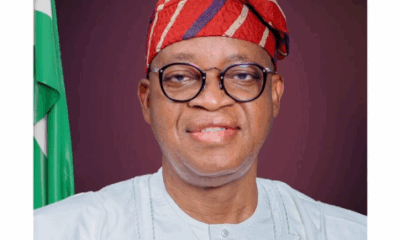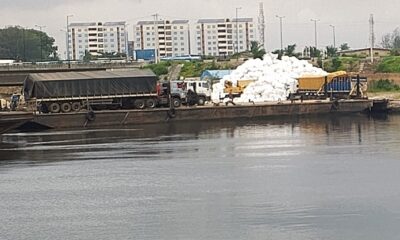Maritime
Nweke Tasks Freight Forwarders On Professional Ethics, Growth of Ports Economy

BY GBOGBOWA GBOWA
Astute and cerebral port operations activist and commentator, Dr. Eugene Nweke Rff HOR has written to his professional colleagues in the freight forwarding industry, charging them to recommit to values and professional best practices that supports the growth of the nation’s port economy.
In the open letter made available to Pinnacle Time, the one-time President of the National Association of Government Approved Freight Forwarders (NAGAFF) noted that the admonition is coming on the backdrop of challenges currently facing the industry. He averred that unless freight forwarders keep faith their occupational cause and remain resilient, the growth and vibrancy of the national port economy may shrink.
Titled “A CALL FOR PROFESSIONAL RESILIENCE AND RECOMMITMENT TO FRIEGHT FORWARDING PRACTITIONERS”, the letter reads:
Dear Professional Colleagues,
We live in extraordinary times, with global events having far-reaching impacts on our national economy, international trade, and the security supply chain. The freight forwarding industry is not immune to these challenges. Despite these challenges, I commend the resilience and efforts of freight forwarding practitioners, association leadership, regulatory council management, and stakeholders in keeping the nation’s ports and economy moving.
However, it is essential to renew our professional steadfastness and commitment to delivering quality freight logistics services. As critical players in the transport logistics industry, we have a responsibility to uphold high professional discipline and maintain quality services.
This clarion call highlights key industry focus areas, changes, and challenges that require our attention:
_a) Port Automation and Digitalization:_ Embracing the national single window and customs migration to the B’odogwu’s trade platform, with a focus on machine learning and artificial intelligence. Upgrading professional skills and expertise is a deserving necessity.
_b) Tax Reform:_ Compliance with the newly signed Tax Reform via the establishment of the Nigeria Revenue Service (NRS). Shippers and practitioners must understand that they are now in the eyes of the sun.

_c) Unified Efforts Towards Redemptive Professional Regulation:_ The need for an informed, structured, and strategically positioned regulatory administration, a functional and all-inclusive CRFFN regulatory administration, is apt. The prevailing situation calls for professional recommitment devoid of sentiments and undue tussle. This is the time for all practitioners to think about building professional legacies.
_d) African Continental Free Trade Implementation:_ The critical role of freight forwarders in driving the process is key. Yet, it appears that greater practitioners are offered a back seat.
_e) Professional Frustration:_ The impact of foreign exchange rates and the dynamism surrounding the China currency swap policy on the profession and citizenry. Equally, practitioners have a duty to raise the bars of their professional discipline high and revisit their roles with regards to supply chain security compliance and shun activities aiding the influx of fake, substandard, pirated, and dangerous imports and exports. It is essential to understand that port automation and digitalization also entail the principles of profiling.
_f) High Cost of Doing Business:_ The need to address too many taxes and charges without cost or duplicated functions. This is a major infraction to the regional transshipment hub objectives. Additionally, in the months ahead, key agencies of the government will be reintroducing new charges and levies, for instance, the reintroduction of 4% customs operation funding, the stipulated charges embedded in the about-to-be-signed-into-law Nigeria Shipping and Port Economic Regulatory Agency, etc.
_g) Efficient and Predictable Shipping and Port Sector:_ The urgent need to address inequitability surrounding our nation’s international trade terms (Incoterms). Also, the need for prompt shipping operations regulations cannot be overstated.
_h) Local Content Laws:_ The need to revisit and reactivate local content laws. The foreign incursions into the profession and the gradual takeover plan by the first-generation port operators and their shipping lines affiliates call for unified fronts.
_i) Industry-Related Concerns:_ Various concerns require the attention of freight forwarding practitioners. The need and time to come together for professional sustainability are now.
To address these challenges and opportunities, we must work together as a profession, sharing knowledge, expertise, and best practices. We must also invest in ongoing training and professional development to stay up-to-date with industry developments.
In light of these challenges, the Sea Empowerment and Research Center calls on freight forwarders to renew their professional resilience and recommitment to delivering quality services.
Thank you for your attention.
Fwdr Eugene Nweke Rff HOR @ SEREC.





































